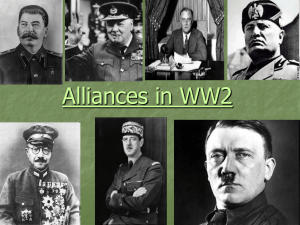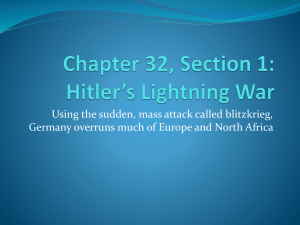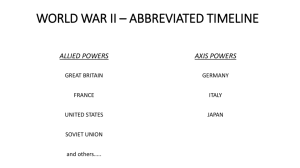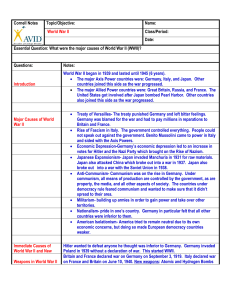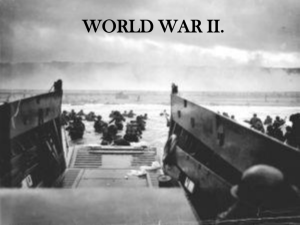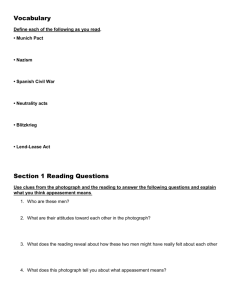World War II
advertisement
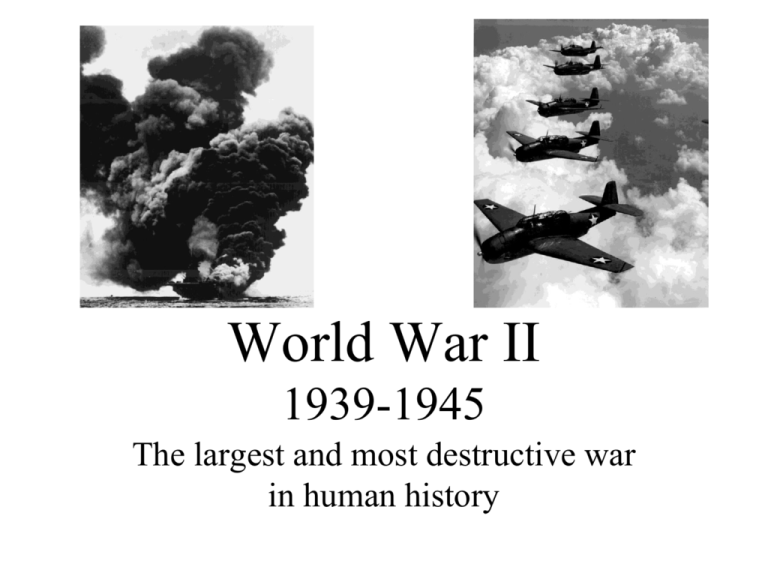
World War II 1939-1945 The largest and most destructive war in human history Causes of WW II • The Treaty of Versailles – Humiliated Germany • Shift of powers in Europe – – – – Britain & France:20th Century’s Strongest United States became world’s most powerful country Soviet Union began rise in power Germany, Italy & Japan became ambitious to be rich and powerful • The Great Depression – Many other countries depended on US wealth Causes of WW II • The rise of Dictators – Hitler, Mussolini & Stalin • Japan, Italy, Germany & the Soviet Union – Japan began to take great strides in becoming the great power in the Asian Pacific – Italy began to conquer African colonies and Western Europe – Germany & the Soviet Union began to build empires in Europe and Asia • European War to World War – Battles in Europe led to war in the Pacific – This involved the United States Division of Powers • AXIS – Germany – Italy – Japan • ALLIED – – – – – Great Britain France United States Soviet Union China Important Individuals • • • • • • • • Adolf Hitler-Germany Benito Mussolini-Italy Joseph Stalin-Soviet Union Neville Chamberlain-British Prime Minister Franklin D. Roosevelt-US President Hideki Tojo-Japan Prime Minister Winston Churchill-British Prime Minister Harry S. Truman-US President Adolf Hitler • • • • Born in 1889 German “Master Race” and hated Jews Served in WWI on the Western Front Developed hate for enemies of Germany after the signing of the Treaty of Versailles • Head of the Nazi party & dictator of Germany • Led Germany into war with Great Britain, France, the Soviet Union and the United States Adolf Hitler • Eventually led Germany to ruin and defeat • Death of millions of people • Destruction of much of Europe • Democracy threatened Germany’s strength • Committed suicide just before WWII ended in Europe (1945) Benito Mussolini • Born in 1883 • One time teacher and journalist • Rose to power in Italy in the 1920’s • Member of the fascist party and dictator of Italy. • Most likable of all other dictators • Known to Italians as “Il Duce” (the leader) Benito Mussolini • Mussolini and Hitler became political partners. Both had very similar beliefs. • Mussolini regarded Hitler once as “a mad little clown” • Built up Italy’s military to regain the glory of the Ancient Romans • Invaded Ethiopia and the League of Nations banned trade with Italy • Died in 1945 Joseph Stalin • • • • Born in 1879 Dictator of the Soviet Union Communist One of the most cruel and feared dictators in history • Brought massive hardship to the Soviet Union • Enemies with Hitler in the beginning. They became allies during the war by signing the Soviet-German Non-Aggression Pact. Britain Prime Minister • Neville Chamberlain – Prime Minister 19371940 – Known for his appeasement foreign policy – Forced to resign after Germany invaded Netherlands, Belgium & France • Winston Churchill – Served as prime minister twice 19401945 & 1951-1955 – Known for his speeches and was a great inspiration to the British people – Worked with Pres. Roosevelt for the final destruction of the Nazi Tyranny Franklin D. Roosevelt • Made efforts to remain neutral in European affairs with a number of neutrality acts. • Elected for a third term in 1940 • Lend-Lease Act with Britain • After the bombing of Pearl Harbor, asked congress to declare war on Germany, Italy & Japan. • Agreed with Churchill that the only possible solution for ending war with Germany & Japan was unconditional surrender. • Died in office on April 12, 1945 Japan • Hideki Tojo – Prime Minister of Japan – Planned attacks on the United States – Was arrested for war crimes and executed in December 1943. • Emperor Hirohito – Emperor of Japan until his death in 1989 – Demanded that Japan surrender after atomic bombs destroyed Hiroshima and Nagasaki Harry S. Truman • Became president after FDR’s death in 1945 • Ordered the Enola Gay, a B-29 bomber, to drop an atomic bomb on Hiroshima, Japan on August 6, 1945 and then 3 days later on Nagasaki, Japan. • Led the US to victory over Germany and the end of WWII in Europe. Timeline • • • • • • 1931-Japan invades Manchuria 1935-Italy invades Ethopia March 1936-Germany invades the Rhineland March 1938-Germany invades Austria March 1939-Germany seizes Czechoslovakia September 1939-Germany invades Poland – Blitzkrieg: Lightening War • September 1939-Breat Britain & France declare war on Germany • September 1939-Soviet Union invades the Baltic (Latvia, Lithuania & Estonia) • 1940-Finland surrenders to Soviet Union Timeline • April 1940-Germany acquires Denmark, Norway, Netherlands & Belgium • June 1940-German troops marched into Paris • August 1940- Germany invades Britain in the Battle of Britain. • October 1940- Germany retreats from Britain • June 1941-Hitler attacks Soviet Union Timeline • December 7, 1941-Japan attack Pearl Harbor, in Hawaii. • December 8, 1941-President Roosevelt asks Congress to declare war. • December 11, 1941-Germany & Italy declare war on the United States. • December 11, 1941-Congress declares war. • January 1, 1942-US joins Allies • April 9, 1942-Bataan Death March • 1942-Allies begin massive bombing in Germany Timeline • April 1942- Battle of Coral Sea in Australia • June 1942- Battle of Midway in Hawaii • June 6, 1944- D- Day: Troops storm the beach at Normandy, France • Aug 1943-Feb 1944- Vicious campaign at Guadacanal (Soloman Islands) • June 1944- Battle at Leyte Gulf in Phillippines • December 6, 1944-Battle of the Bulge: Germans attempt to break through Allied lines in Belgium • March 1945-Allies seize islands of Iwo Jima & Okinawa Timeline • April 1945-Soviets surround Berlin • April 13, 1945- Hitler commits suicide • May 7, 1945-Germany signs unconditional surrender ending war in Europe • May 8, 1945-V-E Day: “Victory in Europe” • July 6, 1945-Test atomic bomb in New Mexico • August 6-9, 1945- Enola Gay drops bomb on Hiroshima & Nagasaki • August 15, 1945- V-J Day: Victory over Japan • September 2, 1945-Japan signs unconditional surrender

